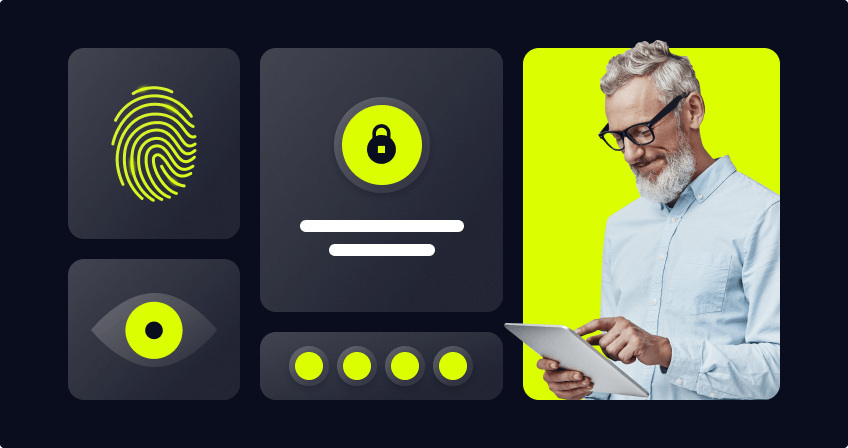
Many businesses believe that the biggest threat to their livelihood is competition from other companies in the same market. However, many businesses fail to realize that cybersecurity threats can cause far more irreversible damage.
In 2021, cybercrime complaints to the FBI rose 7 percent due to the pandemic, with cybercriminals stealing $2.4 billion using social engineering tools to break into business email accounts. Cybercriminals are always looking for new ways to reel in victims.
Thankfully, with better password habits and a solid online security plan, there are ways for businesses to protect themselves from such nefarious activities.
What exactly is online security and why is it crucial for businesses?
Online or internet security is a term that encompasses any tactic aimed at protecting information and data from circulating on the internet.
Hackers often target small businesses because smaller companies lack the resources and tactical skills that corporations can afford to employ.
Hackers also believe that small business owners don’t necessarily invest in a robust cybersecurity strategy as they’re not entirely informed about the latest threats.
As such, hackers tend to believe smaller companies are easy targets that don’t require as much time, planning, or risk. This belief might even lead to multiple smaller companies getting hacked within a narrow timeframe.
On the other hand, big companies can also be prime targets for hackers as the accomplishment of taking down a notable company serves as a kind of trophy.
What are some cybercrime challenges businesses are facing?

In 2019, it was reported that 60 percent of small companies go out of business within six months of falling victim to a data breach or cybercrime. It’s crucial that businesses — both big and small — have measures to prevent this.
Here are some of the challenges small businesses face every day:
Malicious software
Small businesses are at risk of security threats from malicious software. These attacks are extremely costly because they can impact several devices. As a result, companies will need to fork out time and money to repair them.
Insider threats and human error
Cybersecurity experts often say that security is a chain, and like chains, it’s only as strong as its weakest link. For software security plans, the weakest “link” is, in fact, humans.
Whether through vulnerable personal devices, human error, or insider threats, the biggest threat to businesses, both big and small, is the people who work for them. Verizon found that insider threats caused 25% of data breaches.
Phishing
Businesses are generally targeted for email phishing scams. When this happens, a scammer sends an urgent email with a link. These emails often look convincing with spoofed logos and email addresses from a vendor the business works with.
When a staff member clicks on the link, ransomware or other malicious software is installed, locking the business out of their accounts.
Businesses can better protect their data and prevent identity theft by maintaining good privacy and security practices.
10 Cybersecurity tips for businesses
Here are ten things you can do right now to protect your business’s identity and private information using wireless technology.
1. Install antivirus software and keep it updated
Antivirus software prevents your business from ransomware attacks. Always update your software to keep your business protected from the latest threats and deploy security patches that fix vulnerabilities in older versions.
2. Learn about the security tools you’ve installed
Before installing any cybersecurity tool, it’s essential to figure out your needs. Once you’ve established your selected tool, familiarize yourself with the tools you have and learn how to optimize them for better online privacy and security.
3. Use passwords or passcodes even when it’s optional
Passwords are the first line of defense against cyber criminals. Even if passwords aren’t required, make it a point to enable them. When creating passwords, aim for ones with at least 12 characters and use a mix of numbers, symbols, and characters.
4. Sign up for a VPN
A VPN or virtual private network is software that helps you remain private online. With a VPN, your internet connection, information, and data go through an encrypted tunnel, preventing hackers and malicious third parties from hacking your device.
5. Keep copies of essential documents in the cloud
airSlate’s suite of digital tools – airSlate, signNow, and pdfFiller can help you keep documents safe in the cloud. Two-factor authentication, password protection, an audit log, and other security features ensure your sensitive information is safe and your documents are not tampered with. On top of that, it’s easy to access your documents on any device — desktop or mobile.
6. Always use multi-factor authentication
Multi-factor authentication, or MFA, is a method that adds an extra layer of security to accounts. With MFA, users must verify and authorize their login with a QR code, biometrics, or pin.
7. Turn off the “Save Password” feature on browsers
While saving passwords in a browser is convenient, it’s not secure. If a hacker gains access to your computer, they can easily access all your stored passwords. If you receive a pop-up asking you to store passwords while on your browser, disable it.
8. Use different email addresses for different kinds of accounts
Always keep business and personal email accounts separate. Be sure to avoid reusing passwords on either account, too. This reduces the likelihood of all your accounts being compromised if a data breach occurs.
9. Clear your cache
Regularly clearing the cache on a public or shared device helps protect privacy. By removing the cache, anyone who uses the devices afterward will not be able to view browsing histories or saved passwords.
10. Protect your social media accounts
Social media is a great marketing tool for every business. However, when the accounts of social media companies are compromised, it can impact the business’s reputation.
Staying vigilant is key
Nowadays, it’s not enough to just know cybersecurity basics. In fact, hackers and other malicious actors often switch up their methods and find more ingenious ways to take advantage of unsuspecting victims.
It’s critical for business owners and entrepreneurs to protect themselves by staying up to date on the latest types of cybercrime by practicing a healthy level of skepticism whenever they receive something electronically.
Publications like The Verge, Wired, and Hacker News are just some sites that regularly publish information on cybersecurity trends worth reading up on.
